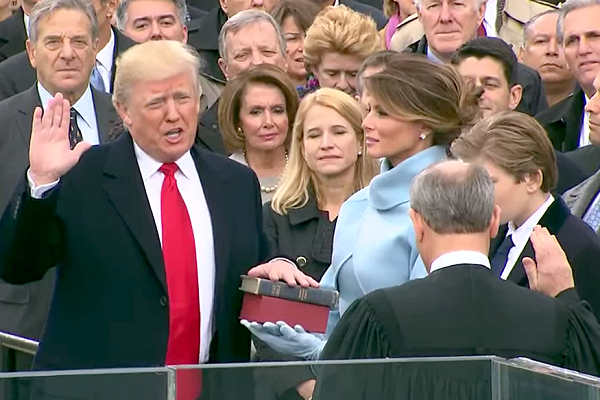
Examining Trump’s Executive Order on Religious Exemptions
- By C Barnett --
- 05 May 2017 --

Trump signs an executive order granting exemptions for religious organizations.
President Trump signed an executive order on Thursday that expands the freedom faith-based organizations have in line with expressing and practicing their beliefs in civil society. As he addressed religious leaders at the White House Rose Garden, he said, "We will not allow people of faith to be targeted, bullied, or silenced anymore. And we will never, ever stand for religious discrimination."
Examining Trump’s Executive Order on Religious Exemptions[/tweetthis]
Explaining the order at the signing ceremony, Trump said that with the new policy, churches could engage in political activities without having their tax relief reprieved. Additionally, religious groups whose beliefs oppose the provision of birth control will be able to reserve their right to provide these services to their employees. Overall, he sent out a message of protection to all organizations that want to exercise their religious beliefs.
Despite these sentiments, the order’s statement is more limited concerning the freedoms religious flanks will possess. Concerning political participation, the order states that the government will "respect and protect the freedom of persons and organizations to engage in religious and political speech" — "to the greatest extent practicable and to the extent permitted by law." As such, some practices such as religious groups endorsing a specific candidate are not permitted.
In line with the healthcare provision for contraceptives under the Affordable Healthcare Act, the order addresses the Treasury, Labor, as well as the Health and Human Services Departments to "consider issuing amended regulations, consistent with applicable law, to address conscience-based objections to the preventive-care mandate." As such, it does not offer an exclusive directive for current measures to be changed. Instead, the changes will have to be discussed, and these talks could end up with the Healthcare Act undergoing no amendments.
Further, there was broader wording in the religious liberty provision. Part of it stated that the Attorney General “shall, as appropriate, issue guidance interpreting religious liberty protections in Federal law." The vagueness in this statement has worried different civil rights groups. This is because the policy could render corporations and organizations that discriminate against the LGBT community immune to persecution. However, a White House representative denied these allegations on Wednesday night during a conference call with the press.
The official also refuted statements from reporters that the order suggests churches and other religious groups would end up being ill-used for the political gain of different parties. He said, "Nobody is suggesting that churches are allowed, or it's legal, for tax-exempt organizations to tax out ads endorsing candidates. That's illegal now for them, as a condition of their tax-exempt status. So we're not changing what's legal, we're not changing what's illegal, just enforcement discretion."
Civil rights groups have not taken the recent signing lying down. Once details of the order were released, the American Civil Liberties Union threatened to file a lawsuit to prevent the policy from being put into practice. They have, however, expressed sentiments to not go forward with court proceedings citing the order had no real power.
Trump Signed An Executive Order On Religious Exemptions For Churches And Employers https://t.co/G9Yl8rVI4F
— Gene Cowan (@genecowan) May 4, 2017
Despite these sentiments, other groups such as the Freedom From Religion Foundation have already filed lawsuits challenging the order. President Trump seeks to put the policy in place as a result of his previous promise to “totally destroy” the Johnson Amendment, a law that prevents tax-exemption from organizations that endorse or oppose political candidates or parties.


















